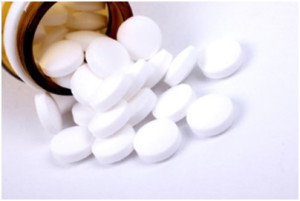The Dangers of Polypharmacy
Author: Dr. Stephen Chaney
 Modern medicines are truly miraculous. They control the symptoms associated with many major diseases. At their best they save lives. But have we become too reliant on medications to cure everything that ails us?
Modern medicines are truly miraculous. They control the symptoms associated with many major diseases. At their best they save lives. But have we become too reliant on medications to cure everything that ails us?
Every medication has side effects, and many medications interact with each other in harmful ways. That has become a major concern for our senior citizens because many of them end up on 5 or more medications, something the medical profession refers to as polypharmacy.
Why Are Seniors Taking So Many Medications?
It starts innocently enough:
 Your cholesterol edges up a bit, and your physician recommends that you go on a statin to reduce your risk of a heart attack. This is in spite of the fact that it has been almost impossible to prove that statins actually decrease heart attack risk in people who have not yet had a heart attack (See “Do Statins Really Work?” (https://www.chaneyhealth.com/healthtips/cholesterol‐lowering‐ drugs‐right/) and “Does An Apple A Day Keep Statins Away?” (https://www.chaneyhealth.com/healthtips/apple‐day‐keep‐statins‐ away/))
Your cholesterol edges up a bit, and your physician recommends that you go on a statin to reduce your risk of a heart attack. This is in spite of the fact that it has been almost impossible to prove that statins actually decrease heart attack risk in people who have not yet had a heart attack (See “Do Statins Really Work?” (https://www.chaneyhealth.com/healthtips/cholesterol‐lowering‐ drugs‐right/) and “Does An Apple A Day Keep Statins Away?” (https://www.chaneyhealth.com/healthtips/apple‐day‐keep‐statins‐ away/))- Sometimes your cholesterol may not even be elevated. In today’s world statins are often recommended if you are over a certain age, are overweight, and have some other risk factor such as pre‐ diabetes or high blood pressure.
- Your blood pressure starts to inch up (something that happens to most people as they get older), and your physician recommends one or two blood pressure medications.
- Your blood sugar gets a bit high, and your physician recommends a drug to control your blood sugar to prevent your pre‐diabetes from turning into diabetes.
- Perhaps you develop a minor arrhythmia (something else that often happens as we get older), and your physician recommends one drug to control your heart’s rhythm and another drug to thin your blood.
Before you know it you are on several medications. As if that weren’t bad enough, each of these medications has side effects, so you often need to add other medications to control the side effects of the original medications. For example:
- Perhaps you develop heartburn, gas, and/or bloating from the statin, so your physician recommends a drug to control those side effects.
- Perhaps you develop headaches, depression, or g.i. symptoms from your blood pressure medication, and your physician gives you one or more drugs to control those symptoms.
I could go on, but I think you get the point. It is easy for senior citizens to end up on multiple medications. The question is whether that is a good thing or a bad thing.
Are Seniors Taking Too Many Medications?
 A recent study (Qato et al, JAMA Internal Medicine, doi:10.1001/jamainternmed.2015.8581, published online March 21, 2016) shows just how big a problem this has become. The authors conducted a longitudinal, nationally representative sampling of community‐dwelling adults aged 62 to 85 years old. They conducted in‐home interviews that included medication inspections with 2351 participants in 2005‐2006 and again with another 2206 participants 5 years later in 2010‐2011. The results were startling:
A recent study (Qato et al, JAMA Internal Medicine, doi:10.1001/jamainternmed.2015.8581, published online March 21, 2016) shows just how big a problem this has become. The authors conducted a longitudinal, nationally representative sampling of community‐dwelling adults aged 62 to 85 years old. They conducted in‐home interviews that included medication inspections with 2351 participants in 2005‐2006 and again with another 2206 participants 5 years later in 2010‐2011. The results were startling:
- Simultaneous use of at least 5 prescription medications increased from 30.6% in 2005‐ 2006 to 35.8% in 2010‐2011. That is a 17% increase in just 5 years!
- The percentage of adults using medication combinations with the potential for major drug‐ drug interactions increased from 8.4% in 2005‐2006 to 15.1% in 2010‐2011. That’s almost double in just the last 5 years! To put that into perspective, it means that almost 1 out of every 6 seniors in this country is at risk of major drug‐drug interactions.
- Most of those dangerous interactions were due to physician prescribed medications, although interactions with over the counter medications also contributed to the total.
The authors of the study concluded “These findings suggest that unsafe use of multiple medications is a growing public health problem.”
The Most Dangerous Drug-Drug Interactions
The problem is that these drug‐drug interactions aren’t minor inconveniences. They can kill you. Here are some of the more dangerous drug‐drug interactions the authors listed: Let’s start with those drug‐drug interactions for physician‐ prescribed medication.
- Statins used in combination with some blood pressure medications or with Coumadin can lead to excessive bleeding, muscle damage and kidney failure.
- The combination of those same blood pressure medications with anti‐platelet blood thinning medications like Plavix dramatically increases the risk of a heart attack and death.
 And, it’s not just interactions of physician‐prescribed drugs that are of concern. Interactions between physician‐prescribed drugs and over the counter medications can be equally dangerous.
And, it’s not just interactions of physician‐prescribed drugs that are of concern. Interactions between physician‐prescribed drugs and over the counter medications can be equally dangerous.
These interactions are particularly insidious because patients often don’t tell their doctors about over the counter medications they are using. For example:
- The combination of blood thinners with pain relievers such as aspirin or Aleve generally leads to excessive bleeding.
- However, the combination of certain anti‐platelet blood thinning medications such as Plavix and either pain medications like Aleve or acid reflux medications like Prilosec can have the opposite effect – causing blot clot formation (such as deep vein thrombosis) which can lead to heart attacks and cardiovascular death.
Is There a Better Way?
 In an editorial that accompanied this study (JAMA Internal Medicine, doi:10.1001/jamainternalmedicine.2015.8597) Dr. Michael A, Steinman said “There are many older adults who would be healthier if they threw away half of their medications. Yet, there are people with multiple chronic diseases who can benefit from multidrug therapy…We [currently] do not have methods that allow us to reliably evaluate medication therapy…for the outcomes that really matter, namely whether a drug is actually helping the patient, causing adverse effects, or is necessary at all.”
In an editorial that accompanied this study (JAMA Internal Medicine, doi:10.1001/jamainternalmedicine.2015.8597) Dr. Michael A, Steinman said “There are many older adults who would be healthier if they threw away half of their medications. Yet, there are people with multiple chronic diseases who can benefit from multidrug therapy…We [currently] do not have methods that allow us to reliably evaluate medication therapy…for the outcomes that really matter, namely whether a drug is actually helping the patient, causing adverse effects, or is necessary at all.”
If your doctor doesn’t really know for sure whether the medications you are taking help you, hurt you, or have no effect, you might be wondering whether there is a better way. The answer is a clear YES!
- Multiple studies have shown that lifestyle change is more effective than medications for keeping blood pressure under control (for example: Guzman‐Castillo et al, BMJ Open, doi:10.1136/bmjopen‐2014‐006070).
- Studies have also shown that lifestyle change is more effective than medications for controlling diabetes (for example: Knowler et al, New England Journal of Medicine, 346: 393‐403, 2002).
- The evidence for heart disease is so strong that both the National Institutes of Health and the American Heart Association recommend that a little TLC (Therapeutic Lifestyle Change) be tried before resorting to statins and other medications to lower cholesterol and reduce heart attack risk (http://www.nhlbi.nih.gov/health/resources/heart/cholesterol‐ tlc).
Fortunately, you don’t need different lifestyle changes for different diseases. One size fits all! I have talked about a healthy lifestyle in great detail in past issues of “Health Tips From the Professor.” In brief, a healthy lifestyle consists of a mostly plant‐based diet with healthy fats, healthy carbohydrates, and healthy proteins. Then add in exercise, weight control, and appropriate supplementation and you have a winning combination.
Why risk the dangers of multiple medications when there is a better way?
The Bottom Line
- A recent study has clearly demonstrated that the use of multiple medications in senior citizens aged 62 and older is starting to reach dangerous levels. Between 2005 and 2010:
- The percentage of seniors using 5 or more medications has increased from 30.6% to 35.8%. That’s a 17% increase in just 5 years.
- The percentage of seniors using medication combinations with the potential for major drug‐drug interactions has increased from 8.4% to 15.1%. That’s almost double and represents 1 out of every 6 senior citizens.
- These dangerous drug interactions aren’t trivial. They include excessive bleeding, heart attack and stroke, renal failure and death, just to name a few.
- There is a better way. Studies have shown that lifestyle change is more effective than medication at controlling many chronic diseases such as heart disease, high blood pressure, and diabetes. Lifestyle change has no side effects and no dangerous interactions. More importantly, you don’t need different lifestyle changes for different diseases. One size fits all! I have talked about a healthy lifestyle in great detail in past issues of “Health Tips From the Professor” (https://www.chaneyhealth.com/healthtips). In brief, a healthy lifestyle consists of:
- A mostly plant based diet that includes healthy fats, healthy carbohydrates, and healthy proteins.
- Exercise, weight control, and appropriate supplementation.
- So if you or someone you love are taking multiple medications, talk with your doctor about the lifestyle changes that you are willing to make. Most doctors would be delighted to reduce the medications you are taking if you are willing to do your part.
These statements have not been evaluated by the Food and Drug Administration. This information is not intended to diagnose, treat, cure or prevent any disease.
